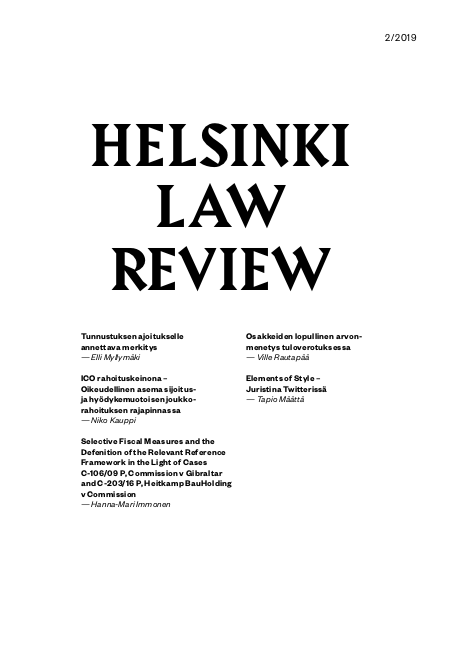Selective Fiscal Measures and the Definition of the Relevant Reference Framework in the Light of Cases C‑106/09 P, Commission v Gibraltar and C‑203/16 P, Heitkamp BauHolding v Commission
DOI:
https://doi.org/10.33344/vol13iss2pp64-75Avainsanat:
eurooppaoikeus, sisämarkkina, valtiontuki, valikoivuus, selektiivisyysAbstrakti
Artikkeli käsittelee verotukseen liittyviä valtiontukia ja tarkemmin verotustoimenpiteiden valikoivuuskriteeriä (selektiivisyys). Valtiontuen määrittämistä verotukseen liittyvissä tilanteissa ja verotuen valikoivuuden juridista arvioimista voidaan pitää suhteellisen haasteellisena, koska arvioinnissa tulee selvittää relevantti viitekehys, jota vasten verotustoimenpidettä tulee tarkastella. Viitekehyksen määrittämisellä on erityistä merkitystä, koska itse veroedun olemassaolo voidaan osoittaa ainoastaan suhteessa niin sanottuun ”normaaliin” verotukseen. Relevantin viitekehyksen käsite on edelleen tulkinnallisesti avoin, vaikka Euroopan unionin tuomioistuin on 2000-luvulla tarkastellut valikoivuusanalyysiä useissa verotukseen liittyvissä tapauksissa. Gibraltar-ennakkoratkaisu laajensi olennaisella tavalla valikoivuuskriteerin ja sitä kautta SEUT 107(1) artiklan tulkintaa. Heitkamp BauHolding-ennakkoratkaisu vahvistaa edellä mainitun tulkintalinjan sekä määrittää entistä tarkemmin SEUT 107(1) artiklan soveltamisalaa. Laajasta oikeuskäytännöstä huolimatta valikoivuusarviointi ja erityisesti relevantin viitekehyksen määrittäminen näyttävät edelleen tulkinnanvaraisilta.



